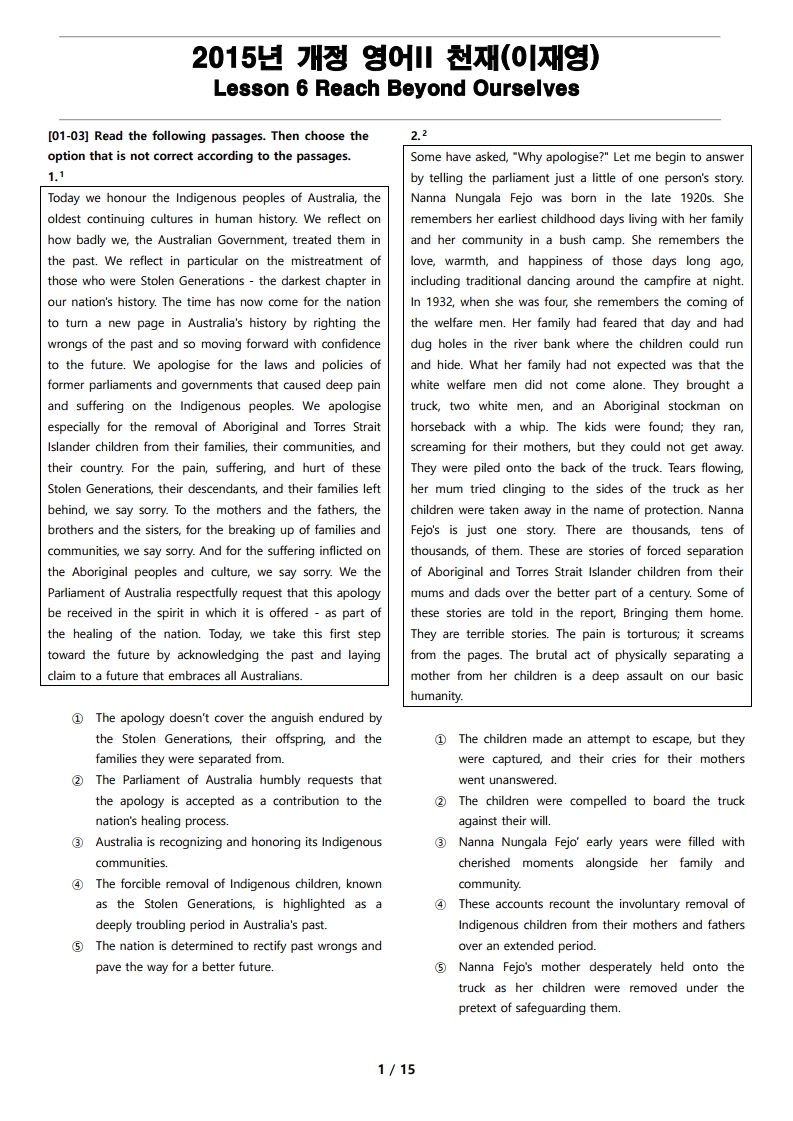2015년 개정 영어 II 천재(이재영)
6과 변형 문제
Reach Beyond Ourselves
일반 워크북 형태의 문제에서 벗어나 The Makings가 만든
2015년 개정 영어 II 천재(이재영) 6과 변형 문제는
출판사에서 오랫동안 영어 번역과 교정을 하셨던 원어민 선생님과
현직에서 강사를 하고 있는 연구진들이 학생들을 위한
최상의 2015년 개정 영어 II 천재(이재영) 6과 변형 문제를 선보입니다.
사고력과 이해력을 요구하는 문제들로 내신 대비 뿐만이 아니라
수능도 한꺼번에 공부하실 수 있는 자료입니다.
중간고사&기말고사 전에 더메이킹스(The Makings)에서
제작한 2015년 개정 영어 II 천재(이재영) 6과 변형 문제로 마무리 하세요.
정답 확인하러가기!
2015년 개정 영어 II 천재(이재영) 6과 변형 문제 Reach Beyond Ourselves
2015년 개정 영어 II 천재(이재영) 6과 변형 문제, 내신대비, 영어 내신자료,고등 영어자료, 고등영어 기출문제,천재 고등 영어자료,고등영어교과서문제, 천재 이재영 자료, 강남구고등학교영어자
themakings.co.kr
themakings.co.kr
The Makings의 2015년 개정 영어 II 천재(이재영) 6과 최종 모의고사는
총 11개의 유형으로 구성되어 있습니다.
1. 글의 내용에 어울리지 않는 문장 고르기(객관식)
2. 글의 내용 일치/불일치(객관식/한글 선택지)
3. 글의 내용 일치/불일치(객관식/영어 선택지)
4. 글 끼어 넣기(객관식)
5. 어법(서술형)
6. 어휘(서술형)
7. 주제문(객관식/영어 선택지)
8. 어휘 빈칸 채우기(서술형)
9. 영작(서술형)
10. 요약문 완성하기(서술형)
더메이킹스(The Makings)가 제작한
2015년 개정 영어 II 천재(이재영) 6과 변형 문제의 지문입니다.
1번 지문
Today we honour the Indigenous peoples of Australia, the oldest continuing cultures in human history. We reflect on how badly we, the Australian Government, treated them in the past. We reflect in particular on the mistreatment of those who were Stolen Generations - the darkest chapter in our nation's history. The time has now come for the nation to turn a new page in Australia's history by righting the wrongs of the past and so moving forward with confidence to the future. We apologise for the laws and policies of former parliaments and governments that caused deep pain and suffering on the Indigenous peoples. We apologise especially for the removal of Aboriginal and Torres Strait Islander children from their families, their communities, and their country. For the pain, suffering, and hurt of these Stolen Generations, their descendants, and their families left behind, we say sorry. To the mothers and the fathers, the brothers and the sisters, for the breaking up of families and communities, we say sorry. And for the suffering inflicted on the Aboriginal peoples and culture, we say sorry. We the Parliament of Australia respectfully request that this apology be received in the spirit in which it is offered - as part of the healing of the nation. Today, we take this first step toward the future by acknowledging the past and laying claim to a future that embraces all Australians.
2번 지문
Some have asked, "Why apologise?" Let me begin to answer by telling the parliament just a little of one person's story. Nanna Nungala Fejo was born in the late 1920s. She remembers her earliest childhood days living with her family and her community in a bush camp. She remembers the love, warmth, and happiness of those days long ago, including traditional dancing around the campfire at night. In 1932, when she was four, she remembers the coming of the welfare men. Her family had feared that day and had dug holes in the river bank where the children could run and hide. What her family had not expected was that the white welfare men did not come alone. They brought a truck, two white men, and an Aboriginal stockman on horseback with a whip. The kids were found; they ran, screaming for their mothers, but they could not get away. They were piled onto the back of the truck. Tears flowing, her mum tried clinging to the sides of the truck as her children were taken away in the name of protection. Nanna Fejo's is just one story. There are thousands, tens of thousands, of them. These are stories of forced separation of Aboriginal and Torres Strait Islander children from their mums and dads over the better part of a century. Some of these stories are told in the report, Bringing them home. They are terrible stories. The pain is torturous; it screams from the pages. The brutal act of physically separating a mother from her children is a deep assault on our basic humanity.
3번 지문
These stories cry out to be heard; they cry out for an apology. Instead, from the nation's parliament there has been a stubborn and complete silence for much too long. There has been a view that we, the parliament, should suspend our most basic instincts of what is right and what is wrong; a view that, instead, Parliament should look for any excuse to push this great wrong to one side and to leave it with the historians and the academics, as if the Stolen Generations are little more than an interesting sociological phenomenon. But the Stolen Generations are not intellectual curiosities. They are human beings; human beings who have been damaged deeply by the decisions of parliaments and governments. But, as of today, the time for denial and delay has come to an end. The nation is demanding that its political leadership take us forward. Decency, human decency, universal human decency, demands that the nation now step forward to right a historical wrong. That is what we are doing in this place today. Let us turn this page together, Indigenous and non-Indigenous Australians, government and opposition, Commonwealth and state, and write this new chapter in our nation's story together. Let us grasp this opportunity to craft new future for this great land, Australia.
'2015년 개정 영어 II > 천재(이재영)' 카테고리의 다른 글
| 2015년 개정 영어 II 천재(이재영)5과 변형 문제 ICT In Our Lives (0) | 2023.08.17 |
|---|---|
| 2015년 개정 영어 II 천재(이재영)4과 변형 문제 Bring Literature Into Your Life (0) | 2023.08.15 |
| 2015년 개정 영어 II 천재(이재영)3과 변형 문제 Future of Money (0) | 2021.08.13 |
| 2015년 개정 영어 II 천재(이재영)2과 변형 문제Discover Cultures Around the World (0) | 2021.08.12 |
| 2015년 개정 영어 II 천재(이재영) 1과 변형 문제 (0) | 2020.05.11 |
